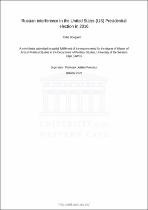| dc.contributor.advisor | Pretorius, Joelien | |
| dc.contributor.author | Bougaard, Jodie | |
| dc.date.accessioned | 2023-05-10T08:06:19Z | |
| dc.date.available | 2023-05-10T08:06:19Z | |
| dc.date.issued | 2022 | |
| dc.identifier.uri | http://hdl.handle.net/11394/9885 | |
| dc.description | Master of Arts - MA | en_US |
| dc.description.abstract | There is significant evidence that the Russian government interfered in the 2016 United States (US) Presidential election, including through direct attacks against US election infrastructure and internet-based disinformation. Interference in the US election in 2016 represented a particularly sophisticated intrusion due partly to the use of cyber operations as an interference tool. Open-source information provides insight into Russia's interference methods; however, the precise motivation for pursuing interference remains unknown. Russian incentives to interfere in the US Presidential elections in 2016 remain a topic of debate in academia, politics, media and popular culture. Experts in the field of International Relations (IR) | en_US |
| dc.language.iso | en | en_US |
| dc.publisher | University of the Western Cape | en_US |
| dc.subject | United States (US) | en_US |
| dc.subject | Presidential election | en_US |
| dc.subject | Interference activities | en_US |
| dc.subject | Russia's power | en_US |
| dc.subject | Global balance of power | en_US |
| dc.title | Russian interference in the United States (US) presidential election in 2016 | en_US |
| dc.rights.holder | University of the Western Cape | en_US |

